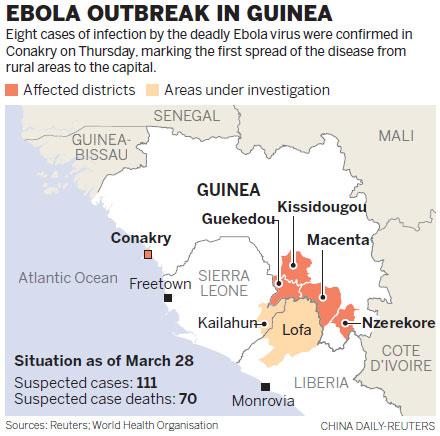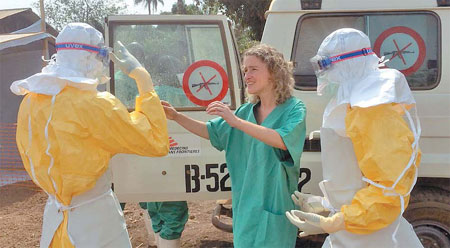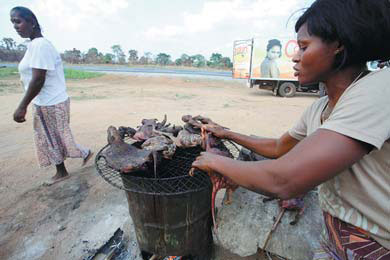Guinea battles Ebola as virus spreads to capital
|
Healthcare workers from Doctors without Borders prepare isolation and treatment areas for their Ebola hemorrhagic fever operations in Gueckedou, Guinea, on Friday. Ebola has no cure and a fatality rate of up to 90 percent. Kjell Gunnar Beraas / MSF via Associated Press |
|
A woman dries bushmeat in Cote d'Ivoire on Saturday. Experts who have studied Ebola have found links between the virus and bushmeat from bats, antelopes, squirrels, porcupines and monkeys that point to the meat as the origin of the virus. Thierry Gouegnon / Reuters |

Senegal closes border; Liberia and Sierra Leone also report cases
Ebola, one of the world's most deadly viruses, has spread from a remote forested corner of southern Guinea to the country's seaside capital, raising fears that the disease, which causes severe bleeding and almost always death, could spread far beyond this West African nation's borders.
In the first outbreak of its kind here, Ebola has already killed at least 70 people, including eight in Conakry, the capital, according to the Health Ministry.
One of the dead was a man whose family brought him to Conakry for medical treatment. Now six of his relatives and two others exposed to him are being kept in isolation at a hospital.
Health officials warn that the arrival of Ebola in this sprawling city of about 2 million people with an international airport could spell disaster.
The World Health Organization said Liberia had reported eight suspected cases of Ebola fever, including six deaths, while Sierra Leone had reported six suspected cases, five of them fatal.
Among the poorest countries in the world, Guinea has severely limited medical facilities and a large population living in slums where the virus could spread quickly.
"Poor living conditions and lack of water and sanitation in most parts of Conakry poses a serious risk of this epidemic spiraling into a crisis," said Ibrahima Toure, country director for the aid group Plan International.
Panic has already grown among residents since the government announced the Conakry cases on national television late on Thursday. While up to 300 patients seek treatment at Donka Hospital most days, less than 100 came on Friday as news spread that the Ebola patients were being quarantined there.
"My daughter is sick and coughing but I prefer to keep her at home. I wouldn't set foot inside Donka Hospital for anything in the world right now," said Djalikatou Balde, a teacher.
International aid groups like Doctors Without Borders and Plan International are trying to educate Guineans about how the disease is spread, and working to identify and isolate anyone who may have been exposed.
There is no cure for the disease, and the virus strain in Guinea has a fatality rate of up to 90 percent. One hundred eleven people have fallen ill already and authorities in neighboring Liberia and Sierra Leone are also investigating suspected cases.
"Above all, we must avoid widespread panic," said Marie-Christine Ferir, emergency coordinator for Doctors Without Borders. "That is why it is so important to spread correct information so people understand the disease and how to protect themselves."
Medical teams have been traveling on foot to villages where cases have been reported. The number of people possibly contaminated expanded exponentially when the first Conakry patient traveled about 430 km across the country in search of help.
AP - AFP
- Malabo Urban Sewage Treatment Project (Equatorial Guinea)
- Final Transfer of Equatorial Guinea's Largest Hydropower Station
- China offers 1,400 tonnes of rice to Guinea Bissau
- Papua New Guinea Prime Minister: CGGC is welcome to participate in infrastructure construction in PNG
- Spain cruise to friendly win in Equatorial Guinea
- Donkeys and dogs, snakes and guinea pigs























